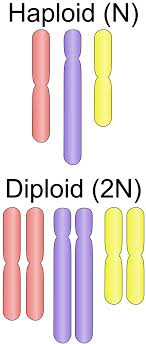haploid
英 ['hæplɒɪd]
美 ['hæplɔɪd]
haploid 单倍体来自希腊语haplos,单个的,单倍的,词源可能同simple,-oid,类,相似。
- haploid (adj.)
- "having a single set of unpaired chromosomes," 1908, from German haploid (Strasburger, 1905), from Greek haploos "single, simple" (see haplo-) + -ploid, from comb. form of ploos "fold" (see fold (v.)) + -oid.
- 1. Such a dikaryon cannot apparently exist independently of the haploid phase.
- 这样的双核体显然不能独立于单倍体阶段而存在.
来自辞典例句
- 2. Embryo has most commonly eitht genetically identical haploid nuclei.
- 胚囊,普通具有8个遗传上相同的单倍体核.
来自辞典例句
- 3. The fungus is unicellular and exists in both haploid and diploid phases.
- 它是单细胞真菌,有单倍体和二倍体两种存在形态.
来自辞典例句
- 4. An exact multiple of the haploid number is called euploid.
- 确切的单倍体数目倍增被称为整倍体.
来自辞典例句
- 5. Mononucleated haploid cells join to produce binucleate cells.
- 单核的单培体细胞连接在一起产生双核细胞.
来自辞典例句
[ haploid 造句 ]
